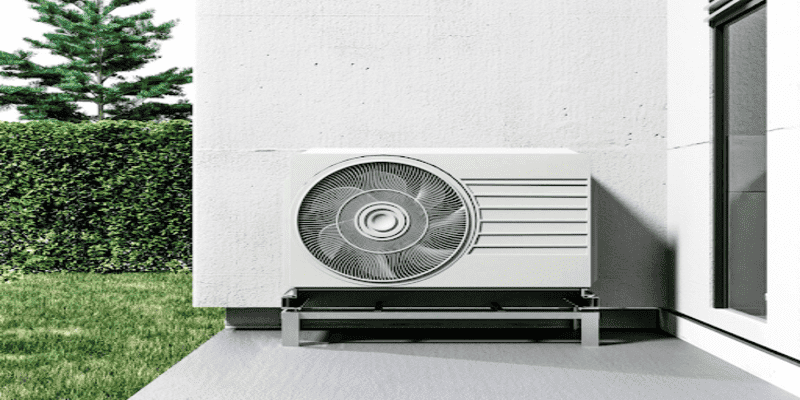Why Is My AC Fan Not Spinning? 6 Common Reasons
Key Takeaways
- Humming without spinning means capacitor failure - This is the most common problem and the easiest to diagnose. That distinct hum tells you the motor has power but lacks the kickstart it needs.
- Check the simple stuff first - Before you call for service, verify the breaker hasn't tripped, clear any debris from the fan area, and replace thermostat batteries. These free checks solve problems more often than you'd expect.
- Never bypass safety to save money - Capacitors hold lethal voltage even when power is off. If you're uncomfortable with electrical work, the service call is worth your safety.
- Sounds are warnings, not normal aging - AC units shouldn't get progressively louder or develop new noises. Squealing, grinding, and labored startups mean something is wearing out. Fix it now before it damages other components.
- Annual maintenance pays for itself - That $100 spring checkup catches a $50 capacitor before it kills a $400 motor. Technicians spot problems you can't see and prevent emergency breakdowns during peak summer.
You step outside to check why your house feels like an oven, only to find your AC's outdoor fan sitting perfectly still while the rest of the unit hums away. Or worse—complete silence when the fan should be running at full speed.
A non-spinning fan means your air conditioner can't dump heat outside, which means no cooling happens inside. Let's figure out what's wrong and what you can do about it. Some fixes take five minutes and zero dollars. Others need a professional. Here's how to tell the difference.
Safety first: Before you touch anything on your AC unit, flip the breaker and turn off the disconnect switch by the outdoor unit. Capacitors hold dangerous electrical charges even when power is off. If you're not comfortable working around electrical components, call an HVAC technician.
How Your AC Fan Actually Works
Your outdoor fan has one job: pull air across the condenser coils to release heat from your home. Without this airflow, refrigerant can't dump its heat, pressure builds up, and your compressor will eventually shut down to protect itself.
The setup is straightforward. A motor spins the fan blades. A capacitor gives the motor its initial electrical jolt to overcome starting resistance—like a battery that provides extra push at startup. A contactor acts as a relay switch, sending power to the motor when your thermostat calls for cooling.
When you lower your thermostat, it signals the contactor to close. Electricity flows to the capacitor and motor. The capacitor releases stored energy, the motor spins up, and the fan starts moving air. This happens dozens of times per day during cooling season.
Two separate fans work in your AC system: the condenser fan outside that we're discussing here, and the blower fan inside that pushes cooled air through your vents. If your indoor air is moving but outdoor fan isn't, the problem is isolated to the outdoor unit.
The 6 Most Common Problems
1. Failed Capacitor
If your outdoor unit hums but the fan won't move, you're almost certainly looking at a bad capacitor. This is the single most common fan failure.
The capacitor stores electrical energy and releases it in a burst to help the motor overcome initial resistance. When it fails, the motor receives power but lacks the extra push needed to start spinning. You'll hear the motor trying—that humming sound—but the fan stays motionless.
 What you'll notice:
What you'll notice:
- Humming from the outdoor unit without any fan movement
- Fan takes several seconds to start, or doesn't start at all
- Clicking sounds when the unit tries to turn on
- If you caught it early: fan struggles at startup or spins slowly
How to check: Turn off power at the breaker and disconnect box. Remove the access panel on your outdoor unit (usually held by screws). Locate the capacitor—it's a cylindrical component, often silver or black, about the size of a soda can. Look for these failure signs: bulging or swollen top, oil leaking from the casing, or rust on the terminals.
If the capacitor looks normal, the problem might be elsewhere. Don't use a multimeter to test it unless you know exactly what you're doing—capacitors store lethal voltage.
The fix: Replacement is the only option. A new capacitor costs $150-$400 including the service call. The part itself runs $15-$50, but you're paying for the technician's expertise and safety equipment. Installation takes 15-30 minutes.
Never attempt this repair yourself. Capacitors hold charges up to 400+ volts and can deliver a fatal shock hours after power disconnection. Even HVAC professionals use discharge tools before touching them.
Why capacitors fail: Heat is the main killer. Your capacitor sits inside a metal box in direct sunlight, often reaching 150°F or higher. This constant heat degrades the internal dielectric material. Most capacitors last 10-20 years, but units in hot climates or poorly shaded locations may need replacement every 5-7 years. Power surges and voltage fluctuations accelerate failure.
2. Burned Out Motor
Sometimes the motor dies without warning—no humming, no struggling, just silence. Fan motors fail less frequently than capacitors, but when they go, the unit stops completely.
 What you'll notice:
What you'll notice:
- Total silence from the outdoor unit
- Burning plastic smell before it stopped working
- Fan was slowing down over weeks or months
- Motor housing is extremely hot even an hour after shutdown
How to check: Turn off all power and wait 30 minutes for components to cool. Reach through the top grille and try spinning the fan blade by hand. It should rotate freely with slight resistance. If the blade is stuck, grinds, or won't budge, the motor bearings have seized. If the blade spins easily but the motor won't run when powered on, the motor's electrical windings have failed.
Check for visible damage: burn marks on the motor housing, melted wire insulation, or corrosion on connections.
The fix: Motor replacement costs $300-$600 with labor. The motor itself runs $150-$300 depending on size and specifications. Motors can't be repaired—once the windings burn or bearings seize, replacement is the only option.
The technician must match the exact specifications: horsepower, voltage, RPM, rotation direction, and shaft size. Installing the wrong motor damages other components or creates safety hazards.
Why motors fail: Running without adequate airflow is the primary cause. Dirty condenser coils restrict airflow, forcing the motor to work harder and run hotter. A failing capacitor can make the motor struggle for months before dying. Older motors with sleeve bearings need annual lubrication—skip this maintenance and bearings dry out and seize. Some motors simply reach end of life after 15-20 years of daily cycling.
3. Electrical Problems
Before you assume something expensive broke, verify that electricity is actually reaching your AC unit. Tripped breakers and blown fuses cause half of all "my AC stopped working" service calls.
What you'll notice:
- Nothing works—not just the fan, but the entire outdoor unit is dead
- The failure happened right after a thunderstorm or power outage
- Circuit breaker is flipped (though sometimes it's partially tripped and looks normal)
- Other appliances on the same circuit are also affected
How to check: Locate your AC's circuit breaker in your electrical panel—usually labeled and often a double breaker (two switches connected). If tripped, the switch will be in the middle position or flipped to OFF. Flip it completely OFF, then back to ON. Don't just flip it to ON from the middle position—it won't reset properly.
Check the disconnect box mounted on the wall near your outdoor unit. Pull out the fuse block and inspect the fuses. A blown fuse will have a broken element visible through the window or a blackened appearance.
Important: If the breaker trips again immediately after resetting, stop. Don't keep resetting it. Something is creating a short circuit and needs professional diagnosis.
The fix:
- Breaker reset: free
- Fuse replacement: $5-$15 at hardware stores
- Electrical repairs: $150-$500 depending on the issue
Most electrical problems require a licensed electrician or HVAC technician. Loose wiring, damaged wire insulation, corroded connections, and faulty breakers need professional repair.
Why this happens: Lightning strikes send surges through power lines. Even if lightning doesn't hit your house directly, nearby strikes induce voltage spikes. Animals chewing through wire insulation create short circuits. Wire connections vibrate loose over years of compressor cycling. Old circuit breakers become sensitive and trip at lower currents than their rating. Aluminum wiring (common in homes built 1965-1973) expands and contracts with temperature changes, loosening connections.
4. Defective Contactor
The contactor is a relay switch that sends power to your fan motor and compressor. When your thermostat calls for cooling, it sends a low-voltage signal to the contactor, which closes and allows high-voltage power to flow. Failed contactors prevent this connection.
 What you'll notice:
What you'll notice:
- Compressor runs (you hear it) but fan doesn't spin
- Rapid clicking sounds from the outdoor unit
- Looking at the contactor: black scorch marks or visible pitting on the contact points
- Contacts stuck together or not closing when they should
How to check: Turn off power and remove the access panel. Find the contactor—a rectangular box with multiple wires, usually mounted near the capacitor. Examine the contact points (the metal parts that touch when the contactor closes). Healthy contacts are smooth and silver-colored. Failed contacts show burn marks, pitting, melted metal, or heavy oxidation.
Don't try to clean or file damaged contacts. This provides only temporary fixes and creates safety hazards.
The fix: Contactor replacement costs $150-$300 installed. The part runs $20-$40, but requires electrical knowledge to install safely. A technician can typically replace a contactor in 30-45 minutes.
Many HVAC techs recommend replacing contactors preventively during maintenance if they show early wear—cheaper than an emergency service call when it fails during peak summer.
Why contactors fail: Every time your AC cycles on and off, a tiny electrical arc occurs between the contacts as they close. Over thousands of cycles, this arcing erodes the metal surfaces. Contactors typically last 10-15 years. Frequent short-cycling (AC turning on and off rapidly) accelerates wear. Moisture infiltration and dust contamination also damage contacts.
5. Damaged Fan Blades or Obstruction
Sometimes the simplest explanation is correct: something is blocking the fan or the blades are damaged.
 What you'll notice:
What you'll notice:
- Visible bent, cracked, or broken blades
- Debris stuck in the fan area—leaves, twigs, plastic bags
- Grinding or scraping sounds (if you heard these before failure)
- Fan blade is loose on the motor shaft
- Fan wobbled violently before stopping
How to check: Power off completely. Look through the top grille of your outdoor unit. Remove any visible debris—leaves, grass clippings, or objects that don't belong there.
Gently push one fan blade. It should rotate smoothly. If it catches on something, stops abruptly, or feels loose, you've found the problem. Check that the set screw (small screw on the hub connecting blade to motor shaft) is tight.
Inspect each blade for cracks, bends, or breaks. Hold a straight edge against each blade to check if they're warped. Even slightly bent blades create vibration and stress the motor.
The fix:
- Clearing debris: free (DIY)
- Tightening loose blade: free (DIY, requires Allen wrench)
- Blade replacement: $100-$250 with service call
Severely bent blades must be replaced. Attempting to straighten metal blades rarely works and compromises structural integrity. Plastic blades that crack cannot be repaired.
Why this happens: Storms blow debris into units. Hail damages blades. Children poke objects through the grille. Cheap plastic blades become brittle from UV exposure and crack. The set screw vibrates loose over time. In rare cases, a failed motor bearing allows excessive shaft wobble, which bends blades.
6. Thermostat Malfunction
Your thermostat controls everything. If it can't send proper signals to the outdoor unit, the fan won't receive the command to start.
 What you'll notice:
What you'll notice:
- Blank thermostat display or error messages
- You lower the temperature setting but nothing responds
- Dead batteries (on battery-powered models)
- Fan won't run even when set to "ON" instead of "AUTO"
- Thermostat feels loose on the wall or wiring looks damaged
How to check: Replace the batteries first if your thermostat uses them. This fixes the problem about 30% of the time and costs $5.
Set your thermostat at least 5 degrees below current room temperature. Wait two minutes. If nothing happens, try switching the fan from "AUTO" to "ON." This should run the blower fan continuously regardless of temperature.
Remove the thermostat face plate and check wiring. Look for corroded connections, loose wires, or wires that have fallen off terminals. Don't touch wires if you see any that are frayed or damaged.
The fix:
- Battery replacement: $5 (DIY)
- New thermostat: $150-$400 installed (basic to smart model)
- Wiring repair: $100-$250
Modern programmable and smart thermostats have circuit boards that can fail. Older mechanical thermostats use mercury switches or bi-metal strips that wear out. Both types eventually need replacement.
Why thermostats fail: Batteries die (replace annually as preventive maintenance). Wire connections corrode, especially in humid climates. Mercury switches in older thermostats stick or leak. Someone installed it incorrectly—common with DIY replacements. Power surges damage electronic thermostats. The anticipator setting (on older thermostats) is miscalibrated, causing short-cycling that confuses the system.
Making Your Fan Last Longer
Your AC fan will last longer with basic maintenance that takes minimal time and money.
Spring preparation: Before summer heat arrives, spray down the condenser coils with a garden hose to remove dirt buildup. Check that fan blades are tight on the motor shaft. Clear winter debris from inside and around the unit. This 20-minute task prevents many breakdowns.
Clear the perimeter: Your outdoor unit needs at least two feet of clearance on all sides for proper airflow. Trim bushes, remove stored items, and prevent grass clippings from accumulating around the unit. Blocked airflow forces the motor to work harder and run hotter, shortening its life.
Filter changes: A clogged indoor air filter restricts airflow through the entire system. This makes both fans work harder. Check your filter monthly and replace every 1-3 months depending on use, pets, and dust levels.
Annual professional inspection: A technician catches problems before they become failures. During a maintenance visit ($80-$150), they'll test capacitor strength, check motor amp draw, tighten electrical connections, measure refrigerant pressure, and lubricate motors that require it. This service call often prevents a $400+ emergency repair.
Surge protection: One lightning strike can destroy your capacitor, contactor, and control board simultaneously. A whole-house surge protector costs $300-$500 installed and protects all your appliances, not just the AC.
Listen for changes: Your air conditioner has a normal sound—the hum of the compressor, the whoosh of the fan. When you hear something different—squealing, grinding, rattling, or labored starting—investigate immediately. These sounds are warnings that something is wearing out.
When You Need a Professional

Call an HVAC technician if you encounter any of these situations:
You're uncomfortable working with electrical components. AC units use 240 volts—lethal voltage that requires respect and knowledge.
You smell burning plastic or see smoke. Turn off power immediately and call for service.
The circuit breaker trips again after you reset it. This indicates a short circuit that needs professional diagnosis.
You've checked the obvious problems (debris, batteries, breaker) and still can't identify the cause.
The repair requires parts replacement and you want confirmation before spending money.
Service call costs: Expect $75-$150 for a technician to diagnose the problem. Many companies include diagnostics in the service call fee. Repairs are additional based on parts and labor. Get a written estimate before authorizing work.
For anyone looking for a smart way to manage an air conditioning system, Sensibo is an excellent option to consider. Sensibo is a device that attaches to your existing air conditioning system, turning it into a smart, internet-connected appliance. This is the way it can provide several benefits to AC systems that enhance convenience, efficiency, and even reduce your energy costs.
FAQ
Can I run my AC if the outdoor fan isn't spinning?
No. Running the AC without a working outdoor fan will overheat the compressor and potentially cause permanent damage. The compressor will go into thermal overload and shut down to protect itself, but repeated overheating shortens its lifespan significantly. Turn off your AC until the fan is repaired.
How long should an AC fan motor last?
Fan motors typically last 15-20 years with proper maintenance. Units in harsh climates (extreme heat, coastal salt air) may see 10-15 years. Lack of maintenance—particularly running with dirty coils or a failing capacitor—can cut motor life in half.
Is it normal for the fan to stop while the compressor keeps running?
No, this isn't normal operation. The fan and compressor should run together during cooling cycles. If the compressor runs but the fan stops, you likely have a bad fan capacitor (if it's a dual capacitor serving both components) or a failed fan contactor. This needs immediate attention.
Can I replace just the fan blades myself without calling a technician?
Yes, if you're comfortable with basic tools. Turn off all power, remove the top grille, unscrew the set screw on the blade hub, slide off the old blades, and install new ones matching the same specifications (diameter, pitch, and number of blades). The risk is matching wrong specifications—incorrect blade pitch changes airflow and stresses the motor.
Why does my fan speed up and slow down instead of running at constant speed?
This indicates either a failing capacitor that can't maintain consistent power delivery, or a motor with worn bearings creating variable resistance. Both problems will worsen. A capacitor showing this symptom will fail completely within weeks to months. Get it checked before you lose cooling entirely.





































.jpg?height=200&name=3888%20(1).jpg)
